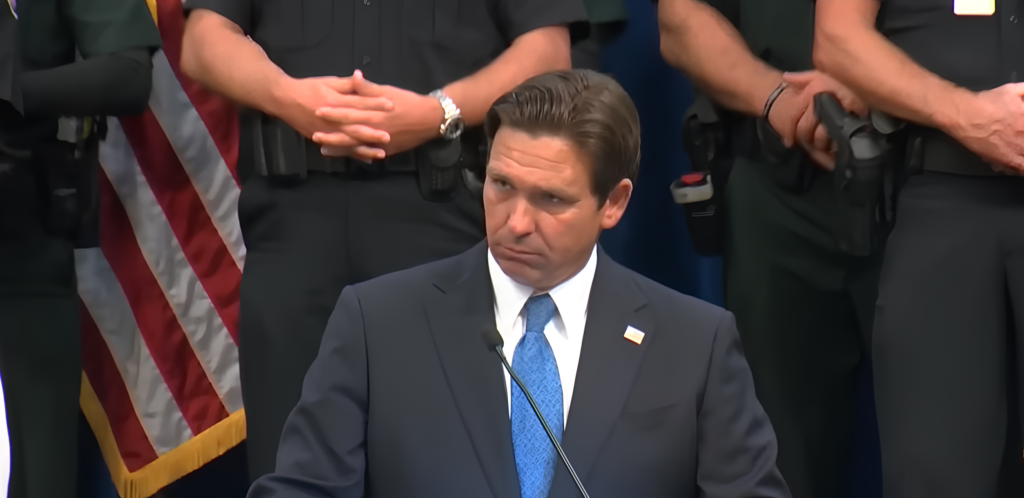DeSantis Blames Republican Boogeyman George Soros for Florida Abortion Amendment

Governor Ron DeSantis has demanded that Florida Republicans publicly oppose a proposed amendment aimed at safeguarding abortion rights in the state’s constitution. DeSantis also called for financial contributions from party members to help fund the campaign against Amendment 4. His remarks were made during a Republican Party fundraising event at the Seminole Hard Rock Hotel & Casino, according to the Sun Sentinel.
Speaking to a large crowd of GOP supporters, DeSantis emphasized that remaining silent or passive on the issue was unacceptable. He framed the upcoming battle as a test of leadership, urging Republican lawmakers to take a stand against what he described as extreme measures that would harm the state.
Constitutional Amendments and GOP Division
The governor’s speech focused heavily on two constitutional amendments set to appear on the November ballot—one concerning abortion rights and another related to marijuana legalization. DeSantis referred to the abortion amendment as an “abortion till birth” proposal and described the marijuana measure as an attempt to establish a “corporate marijuana cartel.” Both amendments, he argued, should be opposed not only by conservative voters but by anyone concerned with the state’s future.
DeSantis took aim at fellow Republicans, particularly those who have been silent on Amendment 4. He praised several GOP members for their public opposition and financial support but criticized others, such as U.S. Rep. Brian Mast and Senators Rick Scott and Marco Rubio, for not yet taking a clear stance.
His warning to Republicans was clear: silence on this issue would allow outside interests to reshape Florida’s laws, much like what has occurred in states such as California, a frequent example used by Florida’s conservatives.
Opposition’s Response
Advocates of the abortion rights amendment rejected DeSantis’ claims, labeling them as scare tactics. Emma Collum, founder of the Reproductive Freedom Coalition of Broward, accused DeSantis of spreading “fear-mongering and scare tactics” with unfounded allegations. She argued that the amendment would restore vital protections for women’s healthcare, and criticized the governor’s claims as dishonest.
Collum also denied that wealthy liberal donors like George Soros were behind the amendment, calling such assertions a “distraction” from the real issue at hand—protecting women’s healthcare in Florida.
Keisha Mulfort, from the ACLU, also dismissed the idea that the amendment would lead to healthcare decisions being made by unqualified individuals. “You wouldn’t go to a dentist for heart surgery,” Mulfort remarked, pointing out the absurdity of DeSantis’ claims. She further emphasized that the amendment does not alter parental rights or require government funding for abortions.
The Marijuana Debate
In addition to abortion, DeSantis took aim at the marijuana legalization amendment, which would allow adults to use marijuana recreationally. He framed the proposal as a corporate power grab, accusing companies like Trulieve of using their financial resources to influence voters. However, Trulieve’s spokesperson, Steve Vancore, countered the governor’s assertions, clarifying that Florida already has multiple active marijuana licenses and that the amendment wouldn’t create a monopoly.
Vancore further disputed claims that the amendment would shield companies from liability, calling DeSantis’ statements “flat out untrue.” Despite the governor’s objections, polling suggests that marijuana legalization enjoys broad support among Floridians, including within the Republican base.
Political Stakes for DeSantis
For DeSantis, the stakes are particularly high. After his failed presidential bid in 2024, his ability to rally opposition to these amendments will play a crucial role in shaping his political future. A loss on these issues could weaken his standing as a GOP leader and diminish his prospects for a 2028 presidential run. On the other hand, a victory could solidify his image as a conservative who can deliver results on the national stage.
Looking Ahead
As the November election approaches, the debate over these constitutional amendments is expected to intensify. Polls suggest that both the abortion and marijuana amendments have substantial public support, but reaching the 60% threshold required for passage remains a challenging task. The outcome will not only determine the future of these policies but will also signal the direction of Florida’s political landscape in the years to come.

